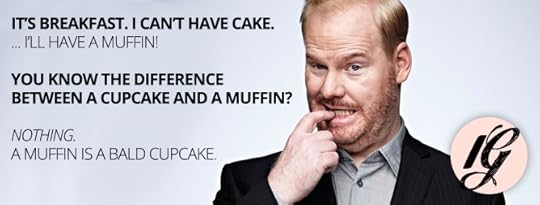Briane Pagel's Blog: Thinking The Lions, page 19
February 11, 2016
Yeah but I did waste a lot of time looking for my paper screwdriver.
I had to put together the new bedframes we bought for Mr F and Mr Bunches last week, and the instruction manual completely accurately gauged the general handiness/intelligence of people, like me, who would be trying to assemble these things.
They told what tools you would need to do the job,including a screwdriver and hammer, and included diagrams of each in case you weren't entirely sure what those were...
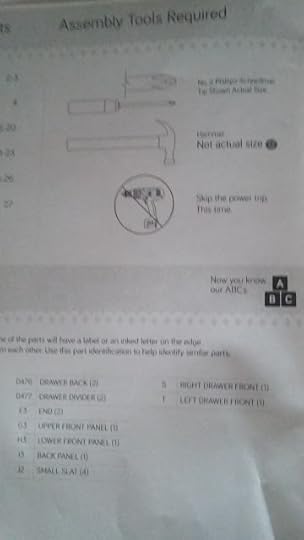
And then, in case you were still a little unsure, they noted of the hammer diagram:
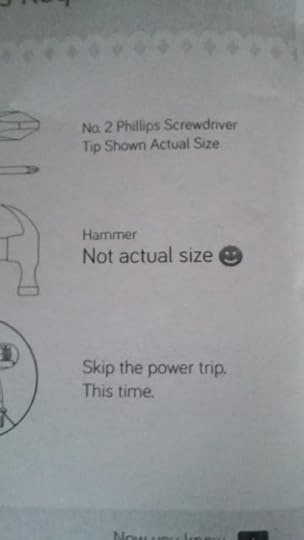
So that you didn't spend all your time searching your toolbox for your miniature hammer.
They told what tools you would need to do the job,including a screwdriver and hammer, and included diagrams of each in case you weren't entirely sure what those were...

And then, in case you were still a little unsure, they noted of the hammer diagram:

So that you didn't spend all your time searching your toolbox for your miniature hammer.
Published on February 11, 2016 18:20
February 10, 2016
I like this joke a lot and nobody ever actually reads anything on Twitter so I'm just posting it here too
Alex Cavanaugh posted:
So I said
Also shirts like these are all now ironic, I think?
This is Planet 9: 3 Known Facts about the Elusive 9th Planet #astronomy https://t.co/MmqNce17YE via @mpax1— Alex J. Cavanaugh (@AlexJCavanaugh) February 10, 2016
So I said
Scientists mad that Pluto's so cool now are all "so anyway we've got a new planet you don't know it it's in Canada." https://t.co/SnAao8l1k3— BrianePagel (@BrianePagel) February 10, 2016
Also shirts like these are all now ironic, I think?
Published on February 10, 2016 04:19
To anyone who's ever said "Muffins are just cake!"
Published on February 10, 2016 04:17
February 8, 2016
Book 9: What makes a good teacher? Probably a good student.
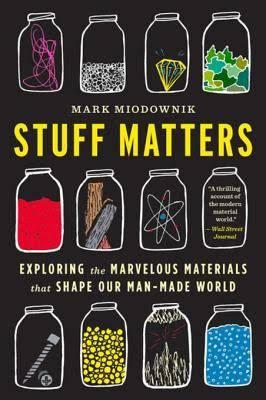 Writing nonfiction is kind of like trying to be a good teacher. I know this because I in fact frequently write nonfiction, in the form of seminar materials, my law blog, and now a book about debt collector secrets. It's harder than most people might think, to be a good teacher. For one thing, you've got to know ridiculous amounts of stuff about the subject you are teaching. For another, you've got to be able to present it in an interesting way.
Writing nonfiction is kind of like trying to be a good teacher. I know this because I in fact frequently write nonfiction, in the form of seminar materials, my law blog, and now a book about debt collector secrets. It's harder than most people might think, to be a good teacher. For one thing, you've got to know ridiculous amounts of stuff about the subject you are teaching. For another, you've got to be able to present it in an interesting way.That latter part, I think, can't be overlooked. I think a lot about how I was really a poor student throughout most of my schooling, until I got to law school. When I was younger (so much younger than today) I would blame my teachers for gaps in my education and/or the fact that I hadn't become a scientist or whatever. If they'd made it more interesting, I thought, I'd have learned more. That's only partially true. Teachers can't be blamed for students who don't try, and I was a student who never really tried until late in the game. It was easy enough for me to get good grades without working at it, so why work at it?
So I bear some of the blame for not learning, but not too much because, after all, I was ages 5-17, and between the ages of 5 and 17 people are basically morons. Even the smartest of us was as dumb as a box of hammers at 17, technically speaking. Whatever you might have known and however intelligent you might be, you didn't know much of anything about the world, people, what life could be like, and most importantly, what good an education was.
We waste education on the young, really. We throw all kinds of things at them in all the wrong ways, forcing kids to sit still and listen much of the time, making them read terrible awful boring things (I have seen what the kids have been assigned, for two decades, to read. OH GOD IT'S TERRIBLE.) We thrown memorization at them and concepts taken out of context and we rarely make learning fun or interesting or relevant.
Everytime a kid says, or said, What are we ever going to use this for? that was the kid, the teacher, and our whole system failing. I can distinctly remember sitting in math class, one of the classes where I had to really fight just to understand it (I passed college algebra by simply memorizing things), bored and confused and struggling to understand the basics. Yet when I used to go jogging, I would help distract myself from how hard it was by trying to calculate how many extra laps I would have to do to go the same distance on the innermost, rather than outermost, lap. I've read a bunch of books about math and related subjects since college, and enjoyed them all.
The problem was, I was being taught very specific kinds of math without any context whatsoever, and not being taught basic concepts or thoughts. It worked the same way with foreign languages, history, almost everything: here are some things you definitely have to know, school said, so memorize them.
I bring this all up because book 9 -- I figured it was time I got around to the subject-- is Stuff Matters by Mark Miodownik. (You probably guessed that from the picture up there.) It's a nonfiction book that explores material science by taking all the materials shown in a picture of the author having a cup of tea. From that basic conceit, the author walks readers through boiled-down explanations of glass, carbon, concrete, chocolate, porcelain, and more. He explains, briefly and without a lot of mumbo-jumbo how these things came into existence, how they work, some of the more esoteric applications of them, and then how they helped shape society, and us. There are interesting tidbits, like the section on concrete curing itself of cracks, or what the difference is between bone china and porcelain (basically: where they are made).
The book isn't dumbed down in any way, but it's accessible: Miodownik explains things clearly but you have to pay attention and think about things to understand and get a lot out of it -- and yet, most readers probably won't mind learning. I got the book on audiobook a week ago and have been listening to it while I take Mr F for his rides, and then finished it up today in the car on a four-hour round trip. Which means I have voluntarily taken about 10 hours worth of science class in the past week, and enjoyed it, and learned something in doing it.
What's most helpful about the book is that it doesn't get bogged down in the details, but teaches you just enough of the specifics to help you understand the larger concepts. For example, I learned why it is that nanomachines can assemble themselves, while cars can't (gravity is not really a force on microscopic scales, while electromagnetic forces are, so gravity can't pull the nanomachines apart.) SEE? I learned why there are different kinds of chocolate and what happens if you heat a diamond up until it becomes red hot (it evaporates) as well as why that happens. Along the way, Miodownik sneaks in a bit of quantum mechanics, some astronomy, and more. It's fascinating.
Miodownik as a writer is not particularly engaging; there was a rather lengthy section on plastics and celluloid written as a mock screenplay that I found kind of annoying in its concept -- but the information was overall presented in a format that allowed me to work past minor annoyances or distractions and still learn.
I had a few really good teachers as a student. I can remember the ones who were good as opposed to interesting. Some teachers were funny but terrible teachers. Others were smart but terrible teachers. The best ones were the ones who found a way to connect with students and get them to see why the material was engaging. I had an English teacher who so loved Charles Dickens that I can still see him acting out the role of Aged P in Great Expectations, but he also explained the larger themes running through Dickens so we could understand the story on a different level. My criminal law professor called on me repeatedly because he knew I thought about the stuff a lot and that I disagreed with him on some things -- so he wanted to draw me out. Those are two that spring to mind. Neither of them was particularly entertaining. They just understood that simply having cool information -- Charles Dickens' stories, criminal statutes -- wasn't enough, and being an entertainer wasn't enough. Teachers (and nonfiction writers) have to find a way to make people care about the subject, and to make the subject inviting.
In Stuff Matters, Miodownik does that. He takes a supercomplicated subject and opens the door by focusing not on esoteric applications, or the mathematical formulae that prove something, or the technical details (you won't learn how to make chocolate yourself), but by picking out things from everyday life -- a teacup, paper-- and showing how the basic thing came into existence, and what its existence means for the rest of society. I never thought about how the fact that paper being bound into a book made learning, and teaching, far easier than paper in a scroll, as it had been prior to binding. (The answer: with books in pages, you can mark a place and easily jump back and forth, so people like preachers could find passages in a bible more easily-- the precursor, as Miodownik explains, to "random access memory" for computers.) That's the kind of stuff the book teaches.
I'm never going to be a materials scientist. But if I'd read this book at 15, or had a class that was like it, I might have given it some thought. It's an introduction not just to materials science, but to why we have to learn this stuff: if you know how paper is made you know why it took so long for us to make it and what it means that we can make it, as well as then how pens work (the ink bleeds into the paper, which is why pens can't be erased so easily, which then made me wonder about erasable pens, and how they work, so after I finished the book I went and looked it up, and found out I was wrong in my theory.)(My theory was that the ink doesn't bleed into the paper right away, but in reality erasable pens have ink that disappears when heated by the friction of the eraser.)
SEE? It not only taught me a bunch but made me wonder about something else, form a hypothesis, and then check it out. It taught me science.
Anyway, that's enough blather. I'm a bit disjointed because I did, after all, drive four hours to and from a thing today. The book is really a very interesting book; not the greatest nonfiction book I've read recently (that honor goes to What If? by Randall Munroe) but still one that should be added to your list if you have even the most cursory interest in science.
Published on February 08, 2016 18:54
Gross.
I'm working my way through Armada by Ernest Cline and as I reached Chapter 4 I thought the worst thing about it was that it repeatedly had the character believe he was hallucinating the strange events that happened at the start of the book -- a hacky cliche that should be retired -- but then I came to this paragraph:
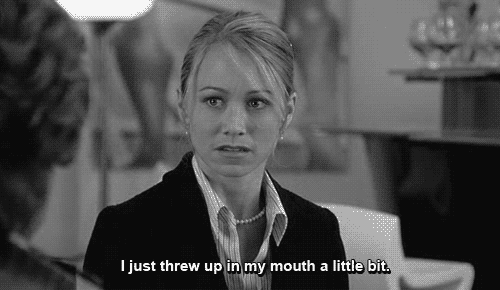
My mother was also ridiculously beautiful. I know people are supposed to say things like that about their mothers, but in my case it happened to be a fact. Few young men know the Oedipal torment of growing up with an insanely hot, perpetually single mom.

Published on February 08, 2016 07:08
Pretty much everybody over 16 is in then I guess.
I was watching Gone In 60 Seconds, and there came a part where Nicolas Cage's little brother wanted in on the heist. He had to give reasons why each guy should be in. One guy was good with electronics, one guy could hack Department of Motor Vehicles computers, and then there was this gy:
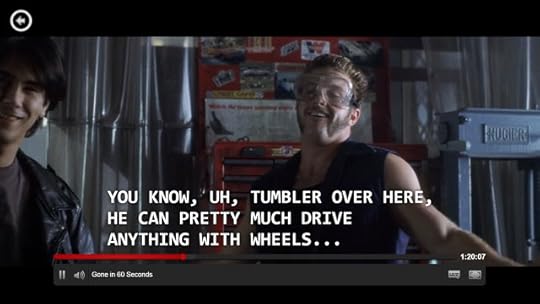
WAIT WHAT? That's all it takes? Literally everybody can be a gangster?

WAIT WHAT? That's all it takes? Literally everybody can be a gangster?
Published on February 08, 2016 05:15
February 7, 2016
This Lego Female Ghostbusters Set Would Only Seem Truly Complete If It Came With A Slobby Lego Minifigure Male Complaining That It Ruined His Childhood
 Photo from Gizmodo, which to its creditDID just call them "ghostbusters."I'm not one of those people who think something can 'ruin my childhood' by being remade in a crappy way. If you like the original, watch the original. If you want to see how Megan Fox and Ryan Reynolds look as The Godfather and Sonny Corleone, then that's your right (?)(I'm a little unclear on whether that's actually in the Constitution.)
Photo from Gizmodo, which to its creditDID just call them "ghostbusters."I'm not one of those people who think something can 'ruin my childhood' by being remade in a crappy way. If you like the original, watch the original. If you want to see how Megan Fox and Ryan Reynolds look as The Godfather and Sonny Corleone, then that's your right (?)(I'm a little unclear on whether that's actually in the Constitution.)So while I definitely don't side with the bros who complain that women in Ghostbusters uniforms will destroy society retroactively or whatever, I'm also a bit unclear on why everyone insists on referring to the team as the Female Ghostbusters. I mean, isn't that just one step up from Waitress vs Waiter? We don't refer to Bill Murray as "a male Ghostbuster." I think society won't truly be equal until we can just call someone a ghostbuster without designating whether they are a ghostbuster or a female ghostbuster.
That, and we should stop cops from freely gunning down black kids, and while we're at it, stop letting billionaires get rich at the expense of everything else. I'd have mentioned those first but I think the whole just be a Ghostbuster thing is at least doable.
Published on February 07, 2016 05:13
February 5, 2016
Book 8: Not a punch but a dagger.
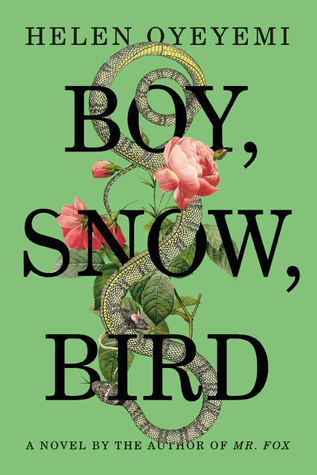 I finished Boy, Snow, Bird two days ago, actually, and my delay in writing about is only partially because the last two nights I was exhausted and didn't feel like doing much of anything by the time 8 o'clock rolled around and I had to sit in the boys' room while Mr F fell asleep.
I finished Boy, Snow, Bird two days ago, actually, and my delay in writing about is only partially because the last two nights I was exhausted and didn't feel like doing much of anything by the time 8 o'clock rolled around and I had to sit in the boys' room while Mr F fell asleep.The other part of the delay was that I wanted to think about the book. Boy, Snow, Bird is the kind of book that's hard to describe, both as a story and as how it affected me.
The storyline is this: Boy, the main character, runs away from her dad, who we mostly know as "the rat catcher." Boy ends up in Flax Hill, where she meets Arturo and Arturo's daughter, Snow. It's a little bit of a spoiler only to tell you that Boy and Arturo fall in love and get married and have a daughter, Bird.
There are other things that I could tell about the storyline, twists and turns and dips and dives, but telling them would spoil the story too much, because at nearly every turn, Boy, Snow, Bird has a surprise waiting. It's the story equivalent of a kaleidoscope, or a detailed diorama that everywhere you look you notice something too new and too perfect, and saying too much about it takes a bit of that magic away.
There's magic, too, in the book, in both the literal and figurative sense. Mirrors behave oddly, it's possible that spiders talk, and people are not always what they seem, both literally and figuratively, too. The story slides in and out of these magical moments without even the slightest hint that they are unusual in anyway.
Most of the story is told from Boy's perspective, with the middle part being narrated by Bird, and neither of them are always likeable or always unlikeable, but they are some of the most interesting characters I've read in a long time.
At it's heart, Boy, Snow, Bird is a kind of semi-modern (it's set in the 40s, 50s, and 60s) take on a fairy tale -- sometimes literally: Snow is practically Snow White, and Boy is frequently compared to an evil stepmother (although it's not clear that she's evil, exactly). There are even a sort of fairy godmother. It's a neat take on the genre: magical realism meets fairytale; it's like the regular world got a quick sprinkle of fairydust: not enough to make it into some Disney world, but enough to make it seem like that's possible.
It's what's lurking down below the surface of the book that really makes you think, though. Through the story, Helen Oyeyemi brings up issues of race and identity, violence and progress, and relationships. There's always a hint of danger boiling below the surface, from the horrifying way the rat catcher works (he uses half-starved rats with their eyes pulled out to lure the other rats out) to the near-fight that Bird and her would-be boyfriend nearly get into with a stranger who accuses the boyfriend of being a Viet Cong, to the Thanksgiving dinner near the end of the story that actually made my skin ache a bit with how tense and terrible it was. There's also love, but it's always a strained sort of love, as people are keenly aware of the imperfections in those they love, and rather than loving them for those flaws, have to actively work to get around them.
I've read books recently that packed a wallop of an emotional punch -- Salvage The Bones, for example, with the devastating look at a dirt-poor family in the week before Katrina hits -- but Boy Snow, Bird contains all that force not in a giant blow, but almost like a dagger in your mind: it sneaks in and before you know it, it's a part of you. I keep rolling over in my mind scenes and stories, like the one where Bird claims to have told two stories to the spiders in her room, the second to get the spiders to not be angry about the first. The book contains lots of little fable-esque stories in it: the characters are always telling each other stories, some of them fantastic fairy tales themselves, others based on what would be the characters' real lives, but which still have a strange, ethereal element to them. There's so much of the book to unpack that I might never stop thinking about it. Which is a good thing, for a story this wonderful.
_____________________________________________________________
By Helen Oyeyemi:
Published on February 05, 2016 18:40
February 4, 2016
Or maybe make a reference to this place being even more boring than Tosche Station. (Star Wars References)
If there was a bright center to the universe, I was on the planet it was farthest from. Please pass the blue milk, Aunt Beru.
Armada: A novel, Ernest Cline.
My theory that Star Wars has become the entire basis of Western Civilization, and will be the only thing remembered about the 20th century a thousand years from now (think that's ridiculous? Beowulf was the Star Wars of 700 AD) keeps getting proven in pop culture. People reference Star Wars to make a point and/or to score cheap points from fans of the movie. Hey we both know that thing from that movie!
Although it's not really that unusual to see a Star Wars reference in a scifi book, it is unusual to see one on page 4, as this one was. On that same page, Cline references Time Bandits, both of which are cheap (clever?) ways of establishing a rapport with his narrator and demonstrating who this person is.
Although if you want to claim to be more than a Star Wars poser, you'd probably want to go for a deeper reference. Maybe say something about getting those units on the South Ridge repaired.
Published on February 04, 2016 05:17
February 3, 2016
"I'm eatin' Samoas from coast to coast, scream dope fresh if you reppin'" *Crowd screams through mouthfuls of crumbs*
The other day I posted what probably is the greatest song ever in the history of the world. Today, listening to that song, I noticed that on Youtube a related video is this one.
This one is not quite as great but still deserves your full attention.
I'm reppin'. I am not 100% sure what that is but if it involves cookies I'm in.
This one is not quite as great but still deserves your full attention.
I'm reppin'. I am not 100% sure what that is but if it involves cookies I'm in.
Published on February 03, 2016 05:50
Thinking The Lions
Do you think people invented "Almond Joy" and then thought "we could subtract the almonds and make it a completely different thing?" or did they come up with "Mounds" first and then someone had a brot
Do you think people invented "Almond Joy" and then thought "we could subtract the almonds and make it a completely different thing?" or did they come up with "Mounds" first and then someone had a brother-in-law in the almond business? And anyway did you ever notice that the almond creates a little mound and that "Mounds" are flat?
I'm probably overthinking this. ...more
I'm probably overthinking this. ...more
- Briane Pagel's profile
- 14 followers



